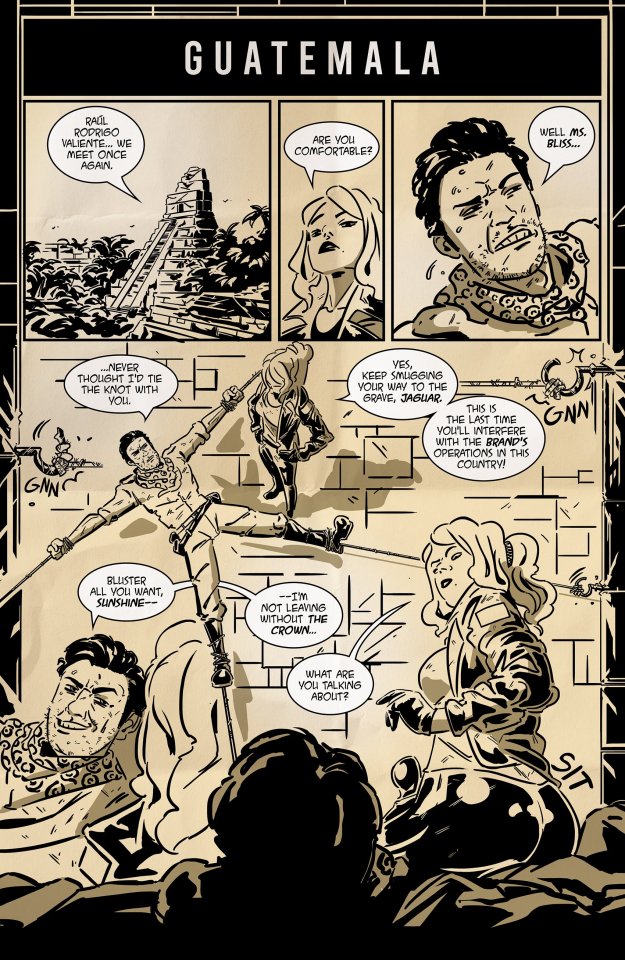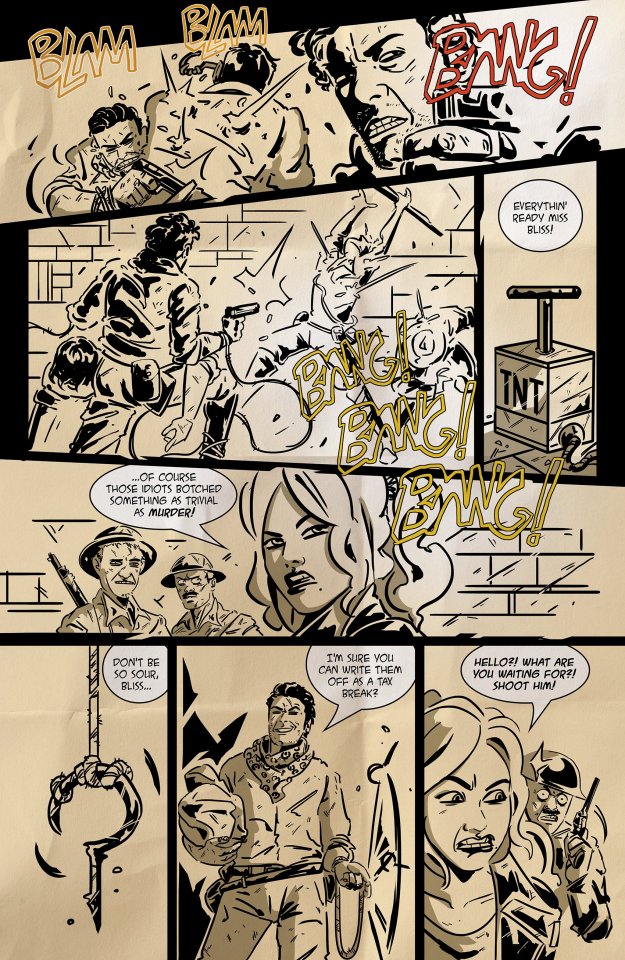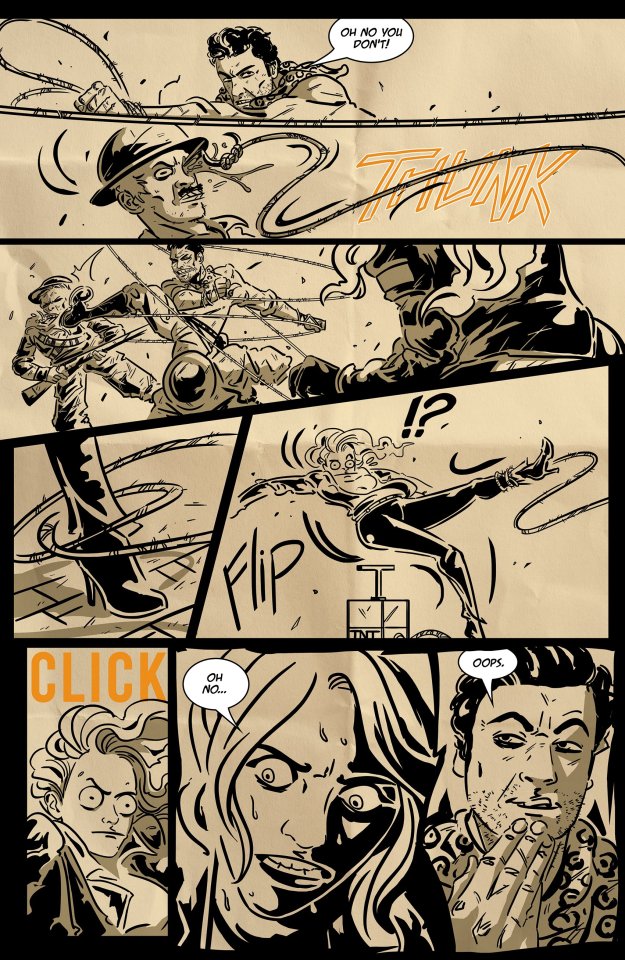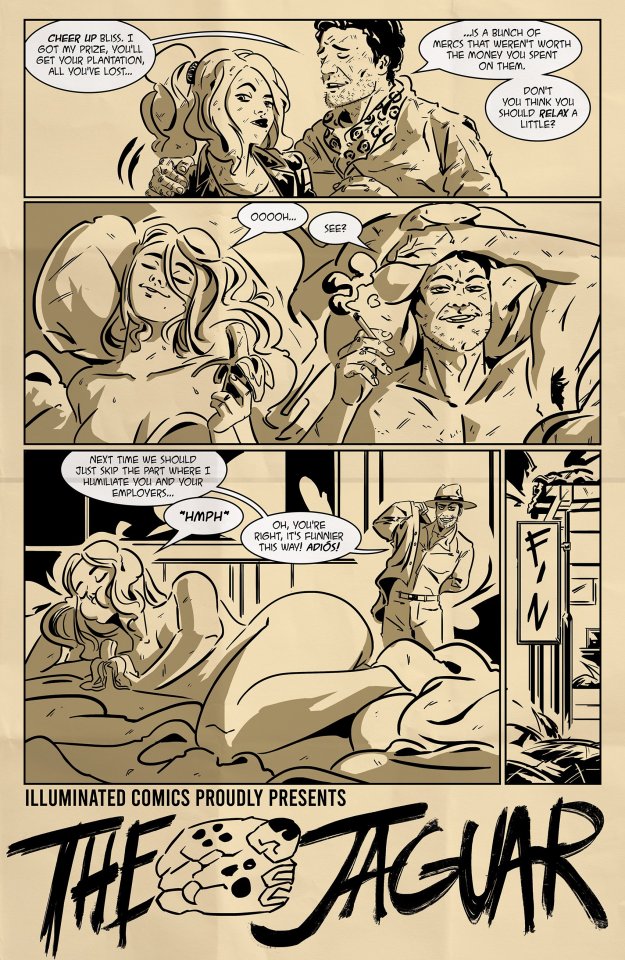#I'm curious as to how they see the inherent divide in their work and where the chemistry originates from
Explore tagged Tumblr posts
Text
Tag limit did me dirty lol.







Illuminated presents: THE JAGUAR
This attempt at a pitch was officially REJECTED so I'm posting it here as well!
#oh I feel you about rejection#but I don't think you should give up just yet ?#clearly this means a lot for you to have put so much effort into a pitch !#so I suppose I'll give my thoughts on this pitch to give you feedback !#I love the art style !#but the action where he breaks out of the bindings (and his method of doing so) don't quite read clearly to me--#does he just pull the hooks out of the wall through sheer force ? is there some part of the interaction that I didn't catch properly ?#maybe foreshadow the break through his thoughts or more talking with miss bliss to visually explore the scene#and slow down a little#I think the “guatemala” panel (the very first one) could use a background to firther set the scene#where are we in guatemala ?#maybe an exterior shot of the temple#the final pages do leave several interesting questions !#are they doing this regularly ?#is it a roleplay dramaticized through the comic or actual canon ?#what's the recurring theme between chapters#if there would be multiple ?#is it capitalist colonial white “ceo” vs latino Indiana Jones style archaeologist#or is it dramaticized bedroom roleplay ?#or is it all a front for their relationship which runs deeper ?#I'm curious as to how they see the inherent divide in their work and where the chemistry originates from#but on a more logistical “pitch” side#did you provide any extra information in the pitch that wasn't presented here ?#because I'm genuinely curious#like is this an example chapter in its entirety or just the broad strokes ?#how is the publishing schedule looking like for adding more ?#I'm reaching tag limit here so I'll be briefer than I want to be#I'm curious as someone trying to break into the market myself trying to learn more#but also as someone who likes your work ! more importantly as someone who likes your work.#mera
48 notes
·
View notes
Note
your latest review made me curious about regency/historical romances featuring the servants or working class characters, how prevalent are they? any you would recommend?
It's not really prevalent, and there are several reasons why.
a) many (not all) historical romance writers do suffer from classist or elitist streaks, and tbh, a lot of historical romance readers also suffer from this streak. There's historically (get it) been this uplifting of not only the wealth that comes with the elite, but simply the title. Like, a lot of dukes have plots where they don't have any money, and that's not new; but them being dukes keeps them "above" and thus venerated by the genre.
b) there is also a big race problem in historical romance. Think the Julia Quinn "I don't write people of color because people of color don't have happy endings" mentality--she's not the only one with that mindset (and I'm gonna be real, in one of the multiple situations where she made comments like this, Eloisa James was pretty much backing her up right there). Not that people of color were inherently working class at all, but I do think that if we had seen more diversity in general in historical romance from the jump, we would also 100% see more working class people depicted in historical romance.
c) there is, either way, an element of fantasy involved. I work very hard for my money, and I'm living paycheck to paycheck nonetheless. I think that there should be more depictions of working class love in historical romance, but I'd be lying to you if I said I sought out books in which, at the end of the story, money remains a big concern for people. It's very stressful for me, versus relatable; and I don't think I'm alone there. There relatability perhaps comes from money being a concern at the beginning, but for me to feel okay with an HEA, I don't want it to be an active concern at the end. This doesn't mean people need to be SUPER WEALTHY or that it needs to be a huge plot factor. But I think this is why the concept of the "interclass" romance exists, or the person who began working class but has become super rich before the story even began. You can start struggling, but you can't end struggling for a lot of readers.
And this, considering my previous point, goes across the racial divide in historical romance--Beverly Jenkins writers about Black characters in the 1800s, but her heroes often come from wealth, or are at least quite comfortable (and often her heroines are the same). Jeannie Lin writes Tang Dynasty Chinese characters who are often of the extreme upper classes. And I think these choices do an extra layer of work when people are writing about people of color, because there is this idea pushed that all people of color did in the past was suffer under white oppression, which ignores thriving communities, massively expansive eras of history, culture, etc. Beverly Jenkins in particular does great work with exploring the different levels of class in 1800s Black America; Forbidden and Indigo are so compelling on that level. As much as the heroines are "working class", the heroes are both wealthy upon meeting them, influential, etc.
So what you will see a lot of is books with the "working class hero has gotten rich", like Dreaming of You by Lisa Kleypas. Neither Derek nor Sara are upper class. She's decidedly middle class, though she makes a good living as an author. She doesn't have titled parents, she doesn't come from a grand house, but she does come from "respectable stock" and is well-bred enough for Derek to feel a way about it. Derek comes from the literal gutter and was essentially a sex worker for years before getting rich enough to invest in his own gambling club. His entire identity is wrapped up in him being lower class and considering himself less than Sara--he can't ever truly drop his accent, no matter how hard he works at it. But he is also.... super rich, lol. Her other self made men are similar; Simon Hunt is looked down on by his heroine initially for being poorly bred, but he's much wealthier than her from the jump and is tight with an earl. Evie Jenner and Sebastian St. Vincent flip this, in a sense. Her mom married down when she got with a gambling club owner, but his money makes Evie an heiress and Sebastian is well-bred but poor, so it all works out.
Lorraine Heath does similar stuff--in her Scoundrels of St. James series, you have one hero who grew up impoverished much of his life but was a secret nobleman, Jack Dodger grew up poor but became wealthy, James Swindler grew up on the streets and is now a respected inspector who probably isn't making a ton of money but is comfortable and has friends in high places and doesn't really want for anything. Kerrigan Byrne has several heroes who grew up in the dredges but are now like, criminal masterminds with tons of money.
I feel like Thief of Shadows by Elizabeth Hoyt gets like... close....? Because Winter is a poor schoolmaster, and though his heroine is a society lady, she's also a widow and she would have to give some shit up to be with him, for sure. Hoyt is much more interested in working class people than a lot of writers, imo--The Leopard Prince has a steward hero (but he gets with an heiress), Scandalous Desires has a heroine who also works at the orphanage and her hero is not upper class at all (but he is a rich pirate--I mean, shit does happen there), Sweetest Scoundrel has a heroine who is not poor but is not legitimate either, and a hero who's trying to build his business.
I can't think of many about servants that don't involve the servant getting with someone who is not a servant, lol. Like, a lot of people recommend An Offer from a Gentleman as the classic "servant heroine" romance, and I'll be real, I super dislike that book in general because I find it boring and the hero is a total flop... But also, the heroine gets with Thee Most Idle Riche guy ever (he's a painter! he doesn't even have rent to collect! Anthony is at least sending out strongly worded "the rent is due" reminders, which... look, there are problems with truly upper class heroes, for sure lol) and it's like... okay..... When a "servant/upper class person" romance hits for me, it hits, but I can be a hard sell. I think the one I've liked most was probably The Leopard Prince by Elizabeth Hoyt, and that was again, a steward hero and an heiress heroine.
Anyway, I have a lot of feelings, on to more recs that might scratch the itch:
The Queer Principles of Kit Webb by Cat Sebastian--the book actually examines class a lot, and while one hero is the son of a duke, there are.......... many things explored there. It's also just super romantic and good and I love it.
Glory and the Master of Shadows by Grace Callaway--the heroine is 1/4 Chinese (but it's not really something she can publicly acknowledge for reasons relating to her birth and her parents'... complex past) and the hero is Chinese and came to England as a young man. She's the daughter of a duke, but he obviously does not come from any kind of title or even heritage the English aristocracy will acknowledge, and I found the dynamic in this one super compelling in terms of how the heroine connected with him over their shared cultural backgrounds that he was super in touch with already, while she felt disconnected.
The Secret Lives of Country Gentlemen by K.J. Charles--one hero is a minor baron but to be blunt he doesn't have a lot of money and power, while the other hero is "working class", but is a powerful smuggler, so the dynamics examined here are super interesting
A Rogue's Rules for Seduction by Eva Leigh--heroine is upper class but doesn't have a lot of money, hero is working class but his family made a lot of cash when he was young, so he remembers being poor but is not now, but still feels that level of being ostracized
What A Rogue Desires by Caroline Linden--this one has a con artist heroine and a second son hero, who actually has to like... shape the fuck up to be worthy of her, which I liked a lot
Any Duchess Will Do by Tessa Dare--very classic class divide, heroine was a barmaid, hero is a duke
But yeah, honestly, I can't think of any books that have worked for me where both sides are not well off--and I think that's partially on me and my taste, but also on the genre making them not super like... popular, accessible, whatever. Often, when you do see the supporting or "servant" characters getting a love story, it'll be in a novella.
27 notes
·
View notes